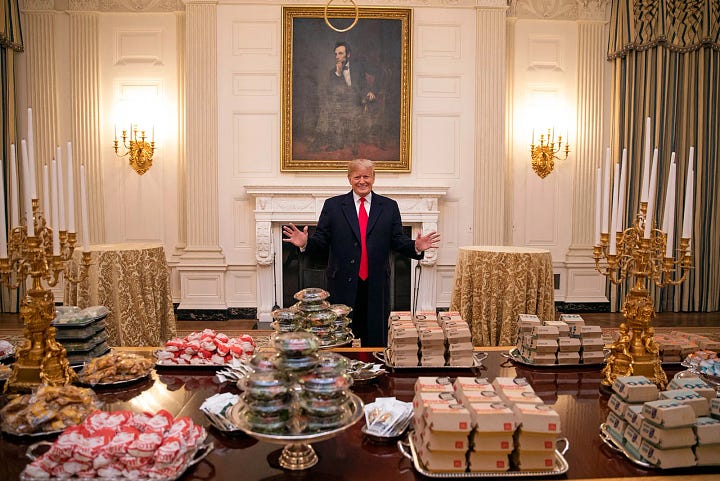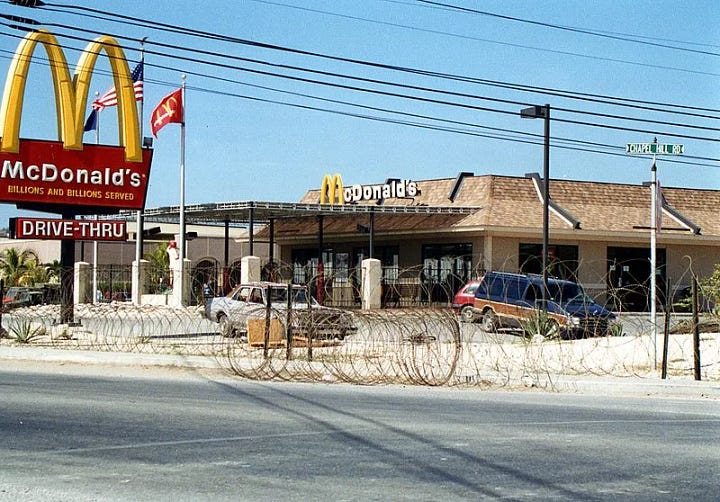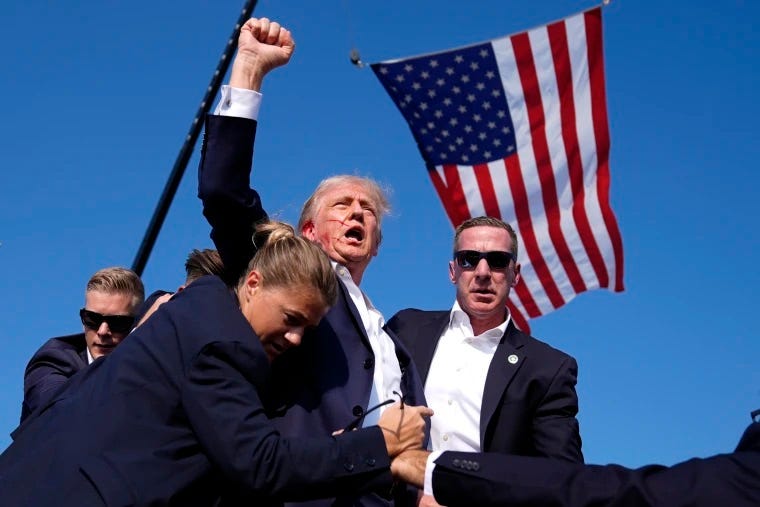McPrison
Saturday, 13 July, was “a dark day in American history,” per Apple News. I can think of many worse. I’ll say, while we still have some semblance of free speech, the whole attempt seems staged.
We know that this is not the natural poise of Donald. (“Grab ‘em by the pussy” comes to mind). There are reports of a diaper-like stench from the man. I must imagine an incontinent near-octogenarian does not recover with acumen and rapidity from true surprise. He’s a celebrity who knows, or surrounds himself with people who know, what it takes to capture paparazzi. Charli told us everybody else does it constantly!
You’ll forgive my skepticism; just hours before this photo was taken, which is basically more important than when this moment occurred, I was in the hotter-than-yore parking lot reading up on occupancy quotas in private prison contracts. 70-100% or your money manyfold back in the United States, host as of 2020 to 2.3 million prisoners (China, 1.6 million).
American inmates produced $11 billion in goods and services in 2022; the national prison industry amounts to $182 billion, spanning services from construction to data management to major financial institution investments. The disproportionate spread of COVID-19 in these facilities means: “Most of these people, they didn’t go in there with death sentences, but they’re dying.” If you have a criminal record—possessing 20 grams of marijuana in Florida equates to a felony—your access to life insurance (a $1 trillion cash cow nationally) becomes kneecapped to final expenses of burial. And usually includes a two-year waiting period. “Meaning that if the policyholder dies within the first two years of having coverage, the policy won’t pay out.”
An analysis:
It goes without saying but it is not being said—this is a phenomenal photo. It bears noting because of this: that’s the point.
Let me dive in a little further. Accidental renaissance, plus a whole real live lady putting her pumping heart on the line for someone with impeccably splattered lines of blood on his fake tan cheek. (Impeccably: not too gory to really think about what violence through guns is).
Co-opting the fist is another story entirely: immediately signaling an alignment with (but not support of) marginalized resistance. Owing to the aforementioned dash of his own blood on his face, the commitment to the bit, as it were, is all the more inarguable.
The expression, nearly clueless, of the agent whose square face cuts the flag of death hanging upside down.
I’ll return us to the woman; she is what I keep looking at, her face half shadowed. It’s the way her bun is just a little out of place although the shade of her hair is perfectly upkept. She was in all likelihood at some point in her menstrual cycle. Her sunglasses are clutched; the faces open to view are his and hers. She is a fragile creature without rights to bodily autonomy. She is in the armpit of the rapist, and she is in a dark navy suit just like everyone else, Rosie the Riveter of 2024.
The perfect blue sky, the five white people making careers of being trustworthy and reliable enough to stand next to the ex-president.
Incomplete men: a haircut’s buzzed sides peeking through, and the arm attached to an unknown face out of frame. The former somewhat in conversation with the incongruous pole (the only ugly thing, compositionally, which is the bit that makes it true art, the one broken piece). And the latter a nimble link to the unassailable future.
Assassination is not available to just about anybody. He gets to be one of the few with eyes on his mortality, politically motivated—a Kennedy, a Roosevelt, a Reagan, a Lincoln. He gets to be the man tougher than Joe, who renews Israeli access to 500lb bombs and is incomprehensible, not the stuff of icons but just the ever-second in command, he who never stepped out of his old shadow presence.
The deaths of both shooter and attendee; death as the life sentence without trial, death as the extremist police state’s “fair game.” (Aaron Bushnell had a gun pulled on him in the midst of his self-immolation protesting genocide in occupied Palestine). The fascist state’s ownership of nuclear weaponry and biometric data tied to both bank accounts and therefore the algorithms running them. The easy trust people have displayed in giving all of ourselves up to robots, to decisions beyond oversight, to malicious contextual adaptation and the coal burned in these wakes.


There is a McDonald’s at Guantanamo. A built normalization of ease (“non-violence”) in the midst of literal torture. In Trump’s photo-op there is also a constructed normalization of ease in the midst of gunfire. As if to bandy about between life and death—your own, others’—is nothing but a matter of waiting for the right moment to be captured.

